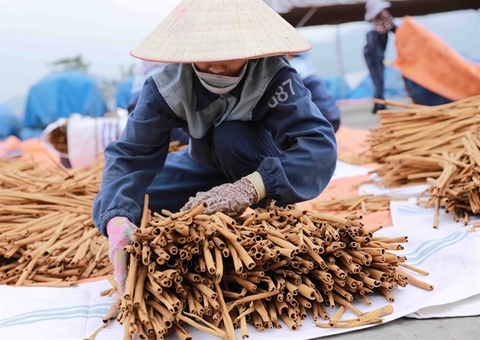
A organically-grown fruit garden in Long An. Pursuing greening strategy will create a competitive advantage for enterprises to expand export. — VNA/VNS Photo
The UK–Việt Nam Free Trade Agreement (UKVFTA) together with other new-generation FTAs were promoting green trade in Việt Nam with the restructuring of supply chains towards resilience and sustainability.
After serious disruptions caused by the COVID-19 pandemic, the US–China trade war, Russia–Ukraine conflict and global climate change, green trade is taking shape and becoming an inevitable trend of global trade.
With commitments on sustainability, environment and labour, new-generation FTAs, including the UKVFTA, provide a push for Việt Nam towards green trade to catch up with the global trend of sustainable development, Đặng Hoàng An, Deputy Minister of Industry and Trade, said.
Việt Nam is in the process of green transition to implement international commitments on sustainable development, energy saving and climate adaptation.
The green commitments provide an opportunity for enterprises to engage in the supply chains with the UK through the creation of environmentally–friendly products and goods which meet standards related to environmental protection and climate change adaptation, he said.
He noted that the process towards carbon neutrality will shift the comparative advantage of exports from labour and energy–intensive sectors to innovation and technology–driven.
Vietnamese Trade Counselor to the UK Nguyễn Cảnh Cường said that there is enormous potential for promoting green trade with UK.
He pointed out that the prospect is bright for the export of steel and iron products which are produced with decarbonisation technology to the UK, adding that the UK is a pioneering country in promoting decarbonisation for the steel industry.
There are also opportunities to increase the export of energy–saving home appliances and equipment such as freezers, washing machines and lights; environmentally–friendly products and products made from recycled materials.
For farm produce, opportunities are for products which are organic. Organic food is of Việt Nam’s advantage and is the trend of British consumers, he said.
He also said that the two countries had large potential to enhance cooperation in green transition, including renewable energy development, sustainable agricultural production, waste treatment, emissions reduction in transport and green finance.
Building sustainable chain
A study by Từ Thúy Anh from the Foreign Trade University published earlier this year pointed out that global trade was moving towards sustainable development, forcing Vietnamese enterprises adjust their business strategies to be able to participate deeply in new value chains. This trend is further driven by the implementation of new-generation FTAs, which also integrate environmental protection and sustainable development.
Another trend in global trade is the restructuring of supply chains towards resilience and sustainability, highlighted after the COVID-19 pandemic which caused serious disruptions.
“Consumer behaviour and trade are changing. Sustainability and efficiency are emerging,” the study wrote. These trends are bringing challenges but also opportunities for Việt Nam to participate deeply in the global supply chain and develop sustainably.
The UK has been one of the world’s leading countries in environment protection, emissions reduction and sustainable development, including policies for green and fair trade.

Cinnamon is one of the products of Yên Bái Province exported to the UK. There is huge potential to promote the export of environmentally friendly and energy saving products to the UK. — VNA/VNS Photo
Pursuing greening strategy will create a competitive advantage, according to Nguyễn Khánh Ngọc, deputy director of the MoIT's European – American Markets Department said.
Vietnamese enterprises should renovate technology and switch to green production to enhance competitiveness, she said.
To be able to take advantages from the UKVFTA, Vietnamese goods, first and foremost, must meet strict standards of the UK in terms of food hygiene and safety, quality, and origin transparency. British consumers pay special attention to corporate social responsibility and the environment protection efforts of producers.
A report on the impact of the UKVFTA on Việt Nam’s exports to the United Kingdom by researchers of Việt Nam National University, University of Economics and Business, Hà Nội, pointed out that the commitments to transparency in quality standards are an essential driving force for improving production in the direction of meeting market requirements for Việt Nam’s export goods.
“The product standards of the UK market are strict; products that want to access the UK market must meet the conditions of information transparency, ensuring that they are produced on a sustainable development process.”
“Vietnamese businesses that want to penetrate the UK market must ensure at least three following issues: standardisation, health, and environment,” the report wrote.
Once products are qualified to enter the highly-demanding UK market, the opportunity for increasing exports to other markets opens significantly.
With 16 FTAs, Việt Nam is one of the most open economies in the world, creating great opportunities to build new supply chains with the partner markets.
Tạ Hoàng Lan, deputy head of the Trade Promotion Capacity Development Department under the Việt Nam Trade Promotion Agency, said Vietnamese enterprises should attach special attention to developing brands for products based on quality and the formation of a sustainable chain to expand in the UK.
According to Ngô Chung Khanh, deputy director of the Multilateral Trade Policy Department under the Ministry of Industry and Trade, as sustainable development is a vital trend, enterprises must develop sustainably if they want to expand in the global market and increase value.
Sustainability will help boost value and build sustainable brands for Vietnamese products and enterprises. “If we pay attention to sustainable development, it will be the ground for us to build brand value, from which the values will grow,” he said.
The most important thing is the change in thinking that going green is not a cost but an investment, he stressed. — VNS